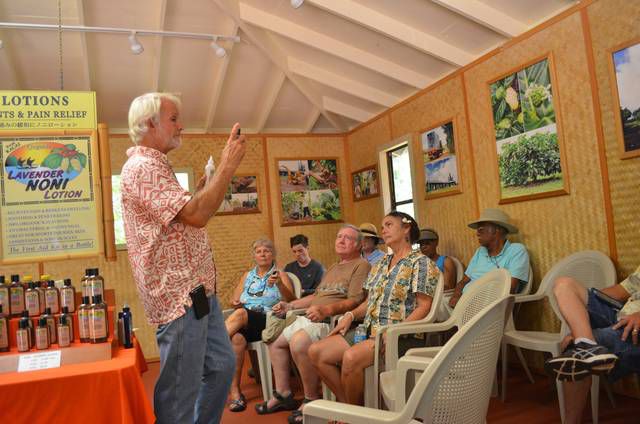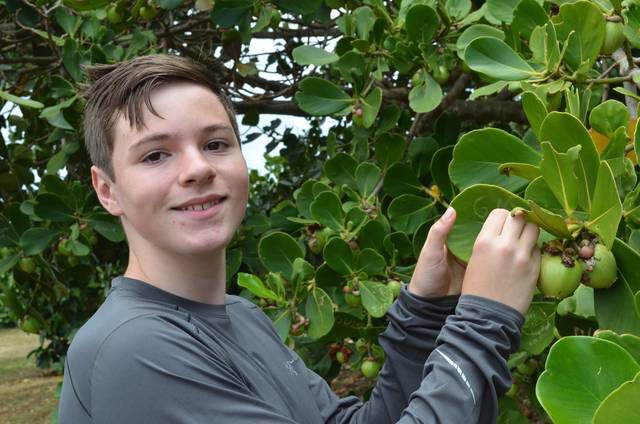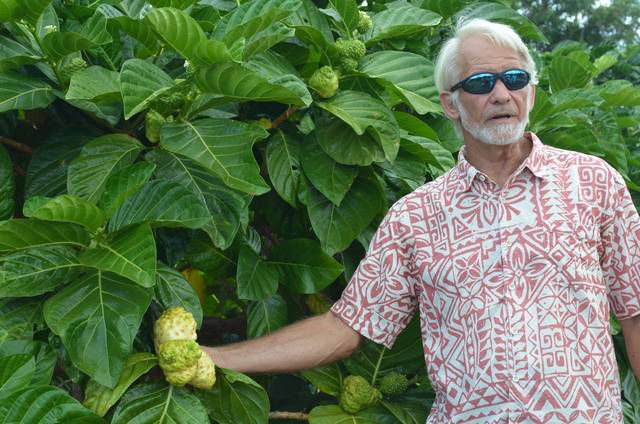KILAUEA — Neil and Mary Fish weren’t sure what to make of the noni they found at one of Kauai’s farmers’ markets. So, the New Hampshire couple took the advice of a resident and went to Kaakaaniu Plantation in Kilauea
KILAUEA — Neil and Mary Fish weren’t sure what to make of the noni they found at one of Kauai’s farmers’ markets.
So, the New Hampshire couple took the advice of a resident and went to Kaakaaniu Plantation in Kilauea Friday to learn more through the organic noni farm’s free tour.
“I don’t know if I would have gotten into this without coming on the tour,” Neil Fish said. “But now, after hearing all about it and learning, I think it’s for me.”
Fish has neuropathy in his hands as a result of chemotherapy, and pain management is one of noni’s traditional medicinal uses. That and dozens of other uses were explained during the three-hour tour of the 37-acre farm.
Paulette and Morgan Gareth of northern Virginia joined the Fishes on the noni tour at the suggestion of their host, because they enjoy all aspects of the culinary arts.
They also visited RetroFarms in Moloaa earlier in the week to buy pineapple and tour the farm.
“We love food and when we travel, we like to see what’s local, what’s the specialty,” Paulette Gareth said.
Central Texas farmer Eddie Bulls and his group were interested to see how agriculture in Hawaii differs from their Lone Star traditions.
“Completely different conditions, here,” Bulls said. “I guess if you go out on the Westside, it’s getting closer to what we’ve got at home.”
Educating visitors about life on a small Kauai farm is the goal for Steve Frailey, who has owned and operated the farm with his family for 30 years. But bringing tourists to his land also helps market his products and keep the farm afloat.
“We bring them in and tell them all about what we do, about noni and organic farming,” Frailey said. “They have this great learning experience and then there’s a chance to buy our products at a discounted rate.”
Frailey has products in about 100 stores throughout Hawaii and across the Mainland, as well as in offices of licensed physicians, and also sells online.
He and his family started the free farm tours three years ago.
“It’s been a massive help,” Frailey said. “The people that come on our tours not only buy products (on the tour), but they tell their friends, and then you’ve got even more people ordering.”
Hosting a free tour is one way to dive into the agritourism industry — it doesn’t require a use permit from the county Planning Department, and there’s an opportunity to sell products during the tour.
Those who want to charge admission for farm tours have to get a use permit from the Planning Department. That is what Will Lydgate did when he started offering tours of Steelgrass Farm in Kapaa.
“It’s a process to get the use permit because you have to get a hearing and support from the community,” Lydgate said.
But, with the support of the neighbors, the process is manageable, and was worth the challenge for Lydgate.
Retailing products through the tours, Lydgate can make twice as much on a product compared to wholesale, and that’s a big draw for Steelgrass Farm.
“Agritourism has a tremendous potential to support real farmers who are really farming,” Lydgate said. “You’re doubling your farm revenue, and there’s an increase if you’re going to charge for the tours.”
Agritourism growing
In the past five years, Kauai has seen growth in agritourism, according to the Kauai Visitor’s Bureau. Some of those activities include tours at Kauai Coffee Co., farm tours and rum tasting at Kilohana Plantation, and touring the Haraguchi Rice Mill.
“Visitors are coming with an interest in better understanding the island they visit,” said Sue Kanoho, executive director of KVB.
She said the weekly tours offered Tasting Kauai, have been an agritourism project that has helped shift Kauai toward becoming a “foodie destination.”
“Keeping agricultural lands in agriculture, educating people about farming and agriculture, as well as sharing the products those lands produce, make it a win-win situation,” Kanoho said.
Preserving the island’s agriculture industry is one of Lydgate’s goals, and he hopes to see the Kauai County Council find ways to help local farmers keep their heads above water.
“It has more potential to get our ag lands back in ag than anything else,” Lydgate said.
Incorporating agritourism into more farming can also help bring back the dwindling agriculture-zoned lands on Kauai and increase local, sustainable food production, he said.
Lydgate would also like to see the budding industry expanded even further, to include legal overnight housing for visitors on farms.
“People would love that. You could stay for a week and pick your own ginger and turmeric, and harvest chocolate,” Lydgate said. “It’s a lot of money that’s being left on the table.”
But even without overnight lodging, farmers opening their operations up for tours are seeing abundant results.
Frailey’s noni products are ordered from all over the world thanks to the farm tours, and Lydgate is expanding his farm operations, planting more vanilla vines and chocolate trees and clearing out invasive species.
“The support that we get from sales in the form of agritourism is awesome,” Lydgate said. “It’s doable. The main thing is to have the goodwill of the neighborhood.”




